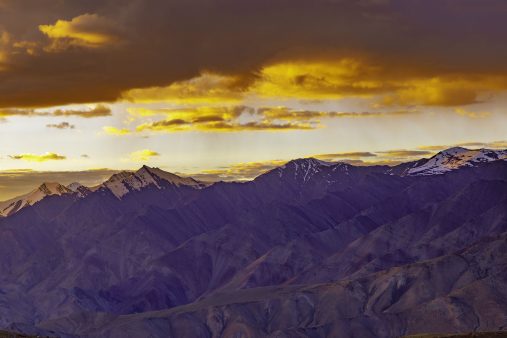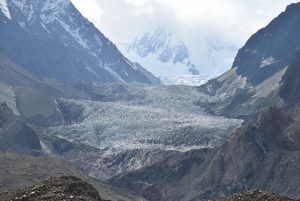Dam burst highlights need for climate change awareness
8 February 2021
Last weekend’s dam burst in northern India has led to loss of life, property and damaged infrastructure. A surge of water from a Himalayan glacier swept away a dam in its path in the state of Uttarakhand. The tragedy highlights the danger of damming rivers against meltwaters swollen by climate change. Dr Abid Mehmood has been exploring (virtually) how we can transform public thinking on climate change in mountainous regions. Here, Dr Mehmood, a Senior Research Fellow at Cardiff’s Sustainable Places Research Institute, speaks about his work.
 “Last weekend’s events in Uttarakhand have shocked the world. Climate change, a melting glacier and human interventions like the dam itself have, in all likelihood, contributed to this tragedy.
“Last weekend’s events in Uttarakhand have shocked the world. Climate change, a melting glacier and human interventions like the dam itself have, in all likelihood, contributed to this tragedy.
At the Sustainable Places Research Institute our research informs awareness about the impact of climate change. We collaborate with partners to find ways of transforming public thinking and perceptions on the climate emergency that lead to effective action.
As part of this mission, I was recently awarded an Impact Accelerator (IAA) grant from HEFCW to work on climate change awareness in Pakistan. COVID-19 restrictions meant activities became virtual, and I began studying climate change awareness and the impact of melting glaciers in mountain regions.
Asia’s average annual temperature has risen approximately 2.9°C over the past century. The Hindukush-Karakoram-Himalayan (HKH) region is often termed the Third Pole. Its mountains and enormous river systems contain the largest freshwater reserves beyond the Arctic and Antarctic. Pakistan has over 7,000 glaciers, but rapid melting rates, currently at 2.3% per annum, can cause erosions, mudflows and landslides.
In addition, pollutants such as microplastics and aerosols are affecting upland ecology, and sprawling towns are increasingly dependent on unregulated tourism.

The United Nations Environment Programme (UNEP) designated 2021-30 as the Decade of Ecosystem Restoration, and so last year, to mark International Mountain Day, I collaborated with stakeholders in Pakistan to organise a webinar with an expert panel to develop an understanding of climate related challenges in the HKH region, inviting leading environmental thinkers from academia, civil society, policy and media to join a panel of experts.
Invitees included Prof Attaullah Shah, Vice Chancellor, Karakoram International University (KIU); Rab Nawaz from WWF-Pakistan, Syed Muhammad Abubakar from International Centre for Integrated Mountain Development (ICIMOD), Ali Tauqeer Sheikh, Mome Saleem and Shabbir Ahmed Mir.
The webinar discussed ways for academia, public bodies, and civil society to collaborate for climate action and reduce the impacts of extreme weather events in a developing country – where climate action has to contend with more pressing problems such as poverty reduction, water supply/sanitation and food security.
The panel identified the following areas for action:
1. Capacity building among local communities to address challenges and adapt with the warming climate, and to re-examine current human-nature relationships, so natural resources are not exploited and environmental shocks are softened.
2. Education and research institutions located close to mountain communities, such as KIU, are best placed to engage with local people to map the geophysical and geopolitical risks, carry out disaster forecasting, asses risks to communities and promote training.
3. Civil society should be supported as a mediating source between academia and policy in mountain areas. NGOs such as WWF and IUCN have been working with local communities and stakeholders to develop science-based solutions.
4. Policymakers need to be much more aware of the plight of mountain communities. Over the next few decades river planes and deltas could suffer permanent loss of upstream fresh water supplies. Across HKH mountain ranges, flows are projected to fall by 60-80%.
5. Local media can play a vital role in highlighting climate challenges in the mountains. However, few opportunities exist for investigative journalism and there is little funding for in-depth coverage. Schools of journalism should focus on teaching climate change subjects and climate reporting.

Overall, the predicaments of remote mountain communities should be prioritised in academic, research, political and policy discussions.
Not only would such efforts raise climate change awareness for greater action but would also contribute to the improvement of climate science, community wellbeing and biodiversity.
The tragedy in Uttarakhand is a stark warning: only by pooling expertise can we develop research, policy, practice and action to tackle the climate emergency.
Dr Abid Mehmood, Senior Researcher, Sustainable Places Research Institute
The Sustainable Places Research Institute is a member of SPARK, Cardiff University’s Social Science Research Park, which brings together interdisciplinary, multi-sectoral and cross-cultural dialogue to tackle societal challenges.

Comments
1 comment
Comments are closed.
Very good work Abid. Glad to see you are so active on the topic of climate change!